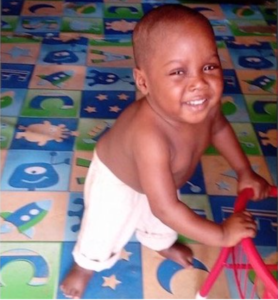Ritualistic killings in Nigeria are rampant. Nigerians call these appalling crimes ‘money rituals’. I have been studying ritualistic killings in Africa since the mid-1970s and have come to the conclusion that Nigeria ranks among the Top-Five of African countries where ritual killings are most widespread. Even if we take into account that Nigeria is Africa’s most populated country, with close to 200 million people in 2017. The following article illustrates this conclusion. (webmaster FVDK)
Why killings for rituals are on the increase in Nigeria
By Evelyn Usman
Vanguard Nigeria
Date published: September 2, 2017, 8:27 AM
The spate of killings for ritual purposes is gradually assuming an alarming rate in Nigeria with little or no effort by concerned government agencies to checkmate the trend. One would have expected such pseudoscience acts to be a thing of the past going by increase in religious activities and in civilization. But murdering people to appease the deities appears to be on the increase.
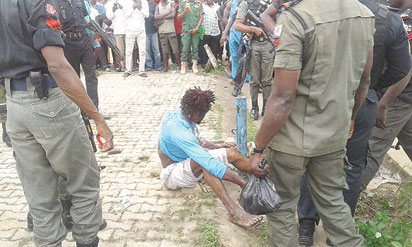
Suspected ritualist arrested – Nigeria
These dastardly acts are carried out in a 21 st century, when other countries of the world are experimenting and advancing in technology. It is also shocking to know that some acclaimed high and mighty indulge in ritual killings. For instance, some politicians and government officials have been accused by arrested suspects and herbalists who allege that they use human beings for rituals in order to sustain their affluence as well as remain in positions of power.
Investigations revealed that cases of ritual killings and disappearance of persons are usually high whenever elections are around the corner. Just last week, this barbaric act assumed a cannibalistic dimension following the arrest of a suspected kidnapper alleged to have killed one of his victims and used his intestines to prepare pepper soup. The suspect, Roland Peter, according to the Rivers State Commissioner of Police, Zaki Ahmed, abducted his victim from his house on August 2017, adding that the suspect was at the verge of eating pepper soup and yam porridge when the police swooped on him and some accomplices.
These vampires hide under different covers to get their victims. For some, they kidnap their victims from various points, while others who pretend to be commercial bus drivers, pick unsuspecting commuters at bus-stop only to take them to their slaughter slabs to carry out what they know how to do best.
Killings for money rituals
On August 17, 2017, the lifeless body of the four-year-old girl was found close to a shrine at 28 Ogbe Close in Iwaya area of Lagos, with her throat slit. In her case, the toddler who strayed from her siblings’ watch, on their way from the mosque, was suspected to have been used for sacrifice on the Ogun shrine which ironically is built in the same compound with her parents. Till date perpetrators of the dastardly act are yet to be fished out.
A week earlier, precisely August 20, another lifeless body of an eight-year-old girl, Chikamso Victory, was found in the apartment of one Ifeanyi Chukwu Dike (23) at Messiah street, Eliozu area of Port Harcourt. Helpless and defenseless Victory was not only abducted by Dike, she was raped before she was killed. As at the time her body was recovered, some parts had been removed. They included her vagina, eyes, tongue and breasts which the suspect kept in a polythene bag awaiting the appropriate time to take them to his contacts. He was however, arrested by members of a local vigilante group while going to dispose of the body. But the incident assumed a laughable dimension following report by the Police that the suspect had disappeared from custody.
Elsewhere in Oyo state, on March 30, 2017, a suspected ritualist, Tunde Jimoh, who was arrested by the Police, gave a chilling description of how he and other members of his gang abducted their victim, Akintoye Oyeyemi, took him into a deep forest and murdered him in cold blood. Thereafter, they took the body to a Muslim cleric to prepare concoction for money rituals for him. At the end of the day, the wrists, heart and legs were cut off. Luck ran out on the suspect while on his way to dump the body in the bush.
Not too long ago, reports had it that an evil forest used as ritualists’ den was uncovered in Enugu state with the recovery of fresh and decomposing human parts .
The nation’s Federal Capital Territory is not speared from the rising trend of killing for rituals. Late last year, a dismembered body of an unidentified lady was recovered at the Lower Usuma Dam junction, along Dutse-Bwari Road. One of her breasts was cut off, while the rest of the body was cut into two from the abdomen, an indication that the killing was for ritual.
Badoo ritual killing
In Lagos state, the commercial hub of the country, different methods are devised by ritualists. One of such was the surge in the killing of residents by members of a dreaded cult group identified as Badoo Boys in Ikorodu area of Lagos. So far, over 50 persons have had their lives snuffed out of them by the perpetrators who were initially thought to be invisible, until they were decimated by the Police, under the watch of the new Commissioner of Police, Lagos State Command, Mr Edgar Imohimi, while he was the Deputy Commissioner of Police in charge of operations.
Before the raid and subsequent arrest of over 200 suspected members of the cult group by the Police with the support of the Oodua Peoples Congress, OPC local vigilante and the Neighborhood Watch Corps, Badoo Boys had been unleashing an orgy of killings, during which they used heavy stones to crush the skulls of their victims. Their modus operandi included storming victims’ residences while they are asleep. It is suspected that they usually hypnotize their victims, as none of them had ever been conscious of their presence. They would, thereafter, smash heads of their victims with a grinding stone and after which they use a handkerchief to clean the blood and brain before leaving the scene.
During interrogation, one of the suspects confirmed that each handkerchief stained with blood was sold for N500,000 . He further revealed that they were mere errand boys for rich politicians within and outside Lagos state. But in their case , the blood and semen stained handkerchief were used to prepare spiritual defence for well to do Nigerians.
Mad people in disguise
The latest method devised is the feigning of madness by these criminal elements. Recently in Lagos, some persons who disguised as lunatics were discovered to be using tunnels as dens for their activities.
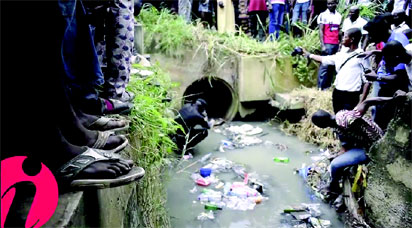
Ritual den – Nigeria
Two instances of note were along Lagos-Abeokuta road and Ile Zik, along Agege Motor road. The latest was an uncovered ritualits’ den Wednesday , at Challege bus-stop, Mushin, where some suspected members who posed as lunatics were found with sophisticated phones, four ATM cards and over 100 syringes with blood stains. One of the suspects was lynched by a mob while two others were rescued by policemen from Area ‘D’ command, Mushin.
Not too long Nigerians received with shock, news of a den in Soka village, Oluyole Local Government area of Oyo state, where about 20 corpses, majority of which were earlier declared missing by their relatives, were found while 18 victims were rescued. From all indications, it was obvious that the den had been existing for long before it was uncovered, following a heap of victims’ clothes. One of the rescued victims was reported to have said he was kidnapped in Ogun while attending an interview.
The most celebrated ritual killing appeared to be the notorious Otokoto saga in Owerri, Imo State where a businessman belonging to a cult was alleged to have used his apprentice for ritual. The boy’s corpse was later exhumed at the premises of Otokoto Hotel. It exposed many other bizarre acts in hotels.
Religious leaders also involved
One would have expected such primitive acts to be going down, going by the increasing religious groups in the country. Regrettably, some leaders of religious have been caught in the act. But investigations have shown that many evil men only use religion as a cover up. They are never true religious leaders.
One of the ready cases that comes to mind was that of the arrest of a Pastor who allegedly killed a seven-year-old boy and buried his head where the church’s alter was mounted. This action was to ensure the influx of members into the church located at Odokekere/ Odogunyan in Ikorodu area of Lagos state.
Elsewhere in Edo state and Ogun states, some pastors were also arrested over similar acts. Few months ago, an unidentified woman who left her abode in Sango Otta area of Ogun in search of spiritual cleansing at the place of a Muslim cleric popularly called Alfa, in Badagry area of Lagos, ended up being victim of ritual killing. A 61-year-old landlord, Toafeek Hassan, who confessed to have slaughtered the woman, was found with her fresh human head and other body parts which were to be used to prepare concoction by the alfa.
Investigation shows that female parts are more in demand than their male counterparts. This is because of what was described as the potency of some parts like the breasts and lower private parts in money rituals and other purposes by herbalists and occult groups.
Ritual used to elongate life
One of the herbalists who spoke with Vanguard at the State Criminal Investigation and Intelligence Department, SCIID, Oseni Bello, admitted to be preparing concoction with human body parts but said he was not involved in the killings. Oseni disclosed that some of the rituals were done to elongate lives. He added that the heart was used to prepare concoction for boldness and fear. He stated further that virgins and babies on the other hand, were used by some politicians and government officials for ritual purposes as their blood is said to be used to elongate the user’s life span as well as fortify them against spiritual attacks. These are some of the reasons, he said, killings for rituals are on the increase.
A particular case in mind was that of a South-West politician alleged to have been caught by his driver with a dissected day-old baby whose blood he was drinking. The incident as reported two years ago, occurred inside a bush, while the driver was taking his boss (names withheld) to a function. Half way into the journey, the politician was said to have ordered his driver to pull over. He thereafter, alighted and headed for a bush with a promise to be back. Having waited without any sight of his boss, the ignorant and curious driver reportedly went in search for him, only to meet him stark naked and pouring the blood of a dissected baby into his mouth. Barely two weeks later, the driver reportedly died under mysterious circumstance.
The event that occurred before his death was related by a Pastor friend whom the deceased confided in before his demise. The lust for money and power drives these people into ritual killings.
While some kill to achieve this unfathomable dream, others resort to digging graves and removing needed human parts for ritual purpose. Saturday Vanguard scooped that most guards at cemeteries connive with agents to sell human parts. It was learnt that if a fresh human head is needed, an agent will contact some cemetery workers ahead. In this case, the cemetery official will be on the look out for fresh dead bodies, preferably those of Muslims who are usually buried within 24 hours after death. Immediately the body is interred, they exhume the body at night, cut off the needed parts and place the body back in the grave.
Human parts for sale
Those who patronize cemetery officials are usually herbalists, herbal traders and even prominent Nigerians who usually use middle men. Surprisingly, human parts are sold in some markets in Nigeria. We gathered that a fresh human head could go for N60,000 and above, while a skull is sold for N20,000. Fresh legs are sold for N30,000 each while a decomposed leg is sold for N20,000. A fresh finger is sold for N5,000 each while the decomposed is sold for 3,000. Fresh intestines are sold for N20,000 while dry ones are sold for N5000. Pieces of fresh bones are sold for N2,000 and above.
Public react
Reacting to the upsurge, the president, Association of Industrial Security and Safety Operators of Nigeria, AISSON Dr. Ona. Ekhomu called on the Nigeria Police to set up Special Ritual Murder Squads in various State Commands to focus on the investigation, detection, arrest and prosecution of ritual killers.
He said that the high incidence of serial ritual killings demands an urgent action at the level of the police high command.
According to the first chartered security professional in West Africa, citizens were rapidly losing faith in the ability of the police agency to detect and punish ritual killers. This, he said was responsible for the increase in lynching of suspects as members of the public resort to jungle justice to get redress for the heinous murders.
Said he: “The conscience of Nigerians should be troubled by reports of recent ritual murders including that of one-year-old Success lme in Calabar whose heart was ripped out from her small body for ritual purposes and was discovered in a Church along with other items for occult rituals.
There is also the case of Pastor Samuel Okpara in Ahoada East LGA of Imo State who was kidnapped, killed and cannibalized by ritualists. The pastor was reportedly beheaded and his liver and intestines used for pepper soup and plantain porridge. What a horrific occurrence?”
He also decried the excesses of the Baddoo murder cult in Ikorodu Lagos State, saying it was a direct challenge to the Police.
Economic recession in the land is not a license to commit ritual murder. Impunity encourages ritualists to commit murders because they believe they will not be apprehended or punished.
I advise Nigerians against late night outings because if a vehicular breaks down one could fall victim of kidnap by ritualists. Commuters should always write down the identification markings of public conveyance vehicles which they enter and make phone calls to loved ones to pass on the information. Because ritual murderers always wish to be unidentified. They want to kill people, but don’t wish to be apprehended. Once information about them has been passed on to someone else, it becomes difficult for them to do evil”.
Nigerians should also assess public transport vehicles before boarding in order not to board the “wrong bus. Likewise, women are advised to carry whistles on them in order to raise an alarm if there is an attempt to abduct them”.
On his part, the national Coordinator, Network on Police Reform in Nigeria , NOPRIN Mr Okechukwu Nwanguma, attributted the rise in cases of killing for ritual to collapse in moral values “
It is also caused by ignorance and superstition, the inordinate quest and pursuit of quick wealth and lack of effective punishment system. In a way, poverty and unemployment may also be a risk factor. If Nigerians have equal opportunities to earn income in legitimate ways, there will definitely be reduction in such abominable crimes like humans killing fellow humans for ritual.”
Also baring his opinion on the matter, Treasurer of the Action Democratic Party, Cross River State Chapter, Offiong Okon, in a recent interview, advised that: “Before a church is established, government should carry out investigation before license is granted because many of the church leaders and founders are ritualists, acting in the capacity of being Pastors.”
“Government should investigate the Pastors and checkmate their activities because what they do under the cover of being a religious leader.”
Source: The Vanguard Nigeria, dated September 2, 2017
Related articles:
How “Badoo killings” sent shock waves across Lagos State in 2017
Vanguard Nigeria, dated January 2, 2017
Assembly to legislate against ritual killings in Kwara
Vanguard Nigeria, dated December 6, 2017
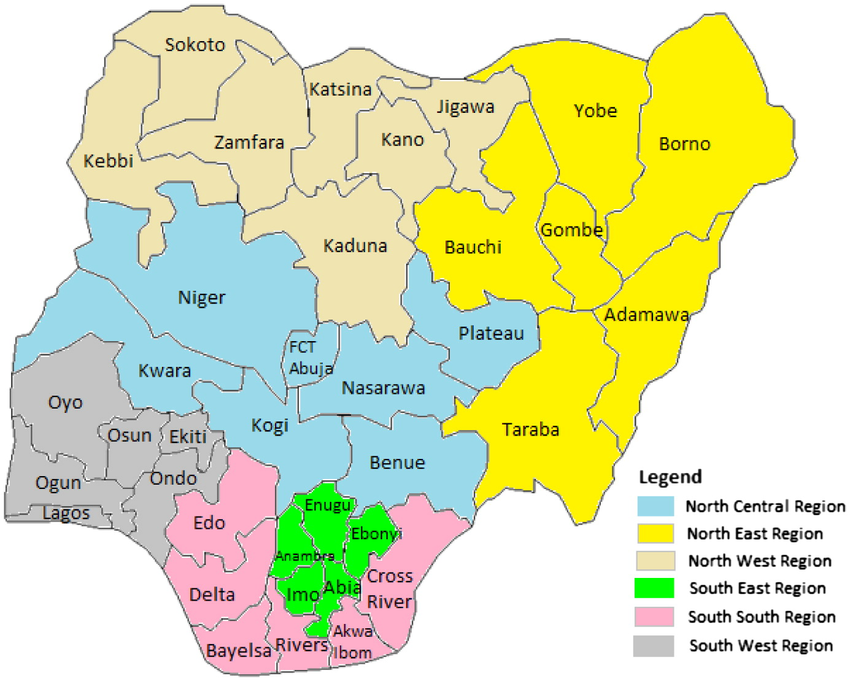
Map of Nigeria showing the 36 states
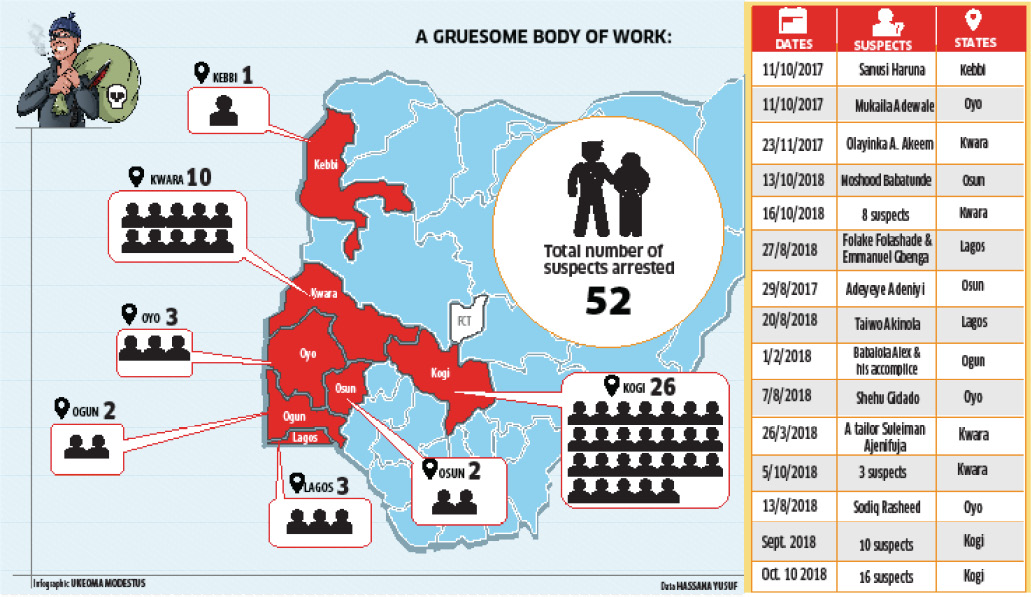 Ritual killings and trade in body parts is one crime that has refused to go away in Nigeria. So far, not less than 55 suspects have been arrested in the past one year for human parts-related crimes in states such as Kebbi, Oyo, Kwara, Osun, Lagos, Ogun, Kogi and Nasarawa.
Ritual killings and trade in body parts is one crime that has refused to go away in Nigeria. So far, not less than 55 suspects have been arrested in the past one year for human parts-related crimes in states such as Kebbi, Oyo, Kwara, Osun, Lagos, Ogun, Kogi and Nasarawa.




